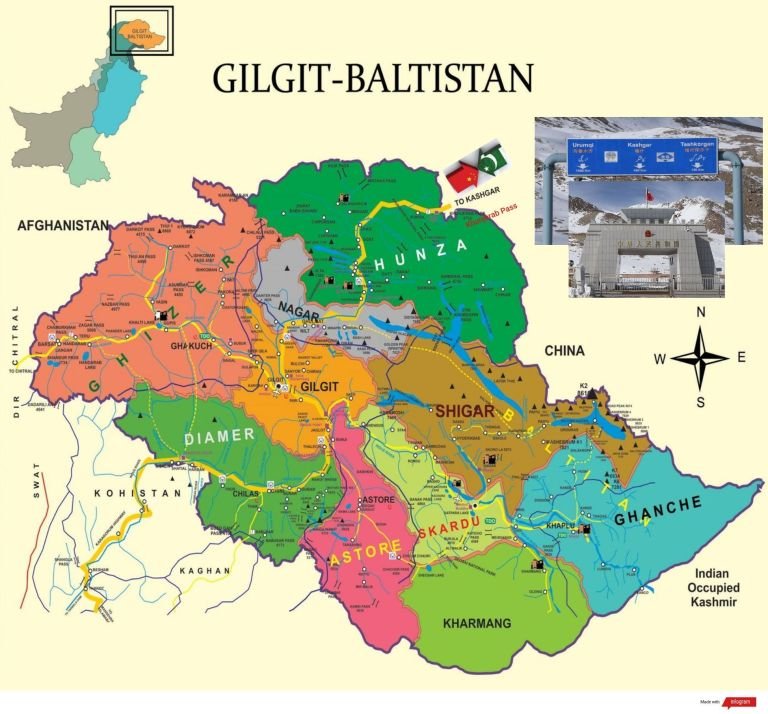By Riaz Akbar
Gilgit-Baltistan’s development profile is remarkable by many standards. Modernity’s thought and systems made an entry to the secluded mountainous region only recently – the 1980s to be exact. Since then, it has witnessed changes in every stratum of life, revolutionizing the rural landscape, public health, education, and the people’s availability and receptiveness to new modes of thinking, some of them quite radical given the conservative core of the local cultures.
The development pace was so rapid that in many cases, social antibodies to change were not afforded enough time to block neoliberal economic development. One of the markers of modern development, according to Karl Deutsche, is the scale of social mobilization, and GB’s social mobilization is quite a feat; it has broken the people out of the traditional model of economy and society and has made a transition into modernity. Judged against the 1970s baseline, GB’s development along this dimension is electrifying. Needless to mention, GB’s first development wave was triggered and spearheaded by the Aga Khan Rural Support Program (AKRSP), one of the pioneers of the non-government rural initiative.
A second development wave appears knocking at GB’s destiny today: a highly educated workforce in the ICT industry, filled with enterprising spirit and ideas is loath to settle for a low paying, dead-end job in the government – as was the case with the previous generation. The new youth bulge that makes up 64% of the 1.5 million population, bravely experiments with entrepreneurship, generates revenue, and provides employment, while at the same time dreaming about even loftier goals. Small entrepreneurs and startups play a fundamental role in modern economies. It was the small entrepreneurs who earned China the global leadership position in economic development. People tend to dismiss or forget the fact that the rise of the US too was powered by small entrepreneurs.
Does the GB government understand the criticality of the moment? Will it rise to its call? Failing to do so will not just be an opportunity wasted but an issue of incalculable social and political disaffection and disorder. A lukewarm response or misreading of the opportunity will doom GB for a long time.
There is hoped though, as the new chief executive, Khalid Khurshid, is, perhaps, the first youngest chief minister of GB in its history and one who is educated in the West. He understands the main drivers of development. He has already shown an impressive understanding of GB’s issues and won grants and projects from the federal government on an unprecedented scale in its history. It is with that hope, I will be spelling out a youth-led development agenda for GB in a series of articles in the weeks and months ahead.
To begin with, I outline four areas in the private sector of youth-led trades/industries which can kick start GB’s economy and increase the whole pie of the budget, without big “ifs” of investment and legislation. In subsequent articles, other important dimensions of development will be discussed.
The private sector in any country is crucially useful for two purposes; (a) generation of revenue in the form of direct taxes, and (b) creation of employment which increases spending in the economy further generating revenue. But for that to seamlessly come about, some actions are warranted by the government.
SPECIALIZED MARKETPLACES
Cash crops, fruits, and dry fruit
Having a complex market landscape is one sign of a strong and well-developed economy. The more complex an economy, the more differentiated and specialized it becomes. In most cases, GB’s economy and its many facets are in a developing phase. At the bare minimum, the government must establish specialized markets for different trade forms. Let’s for example, consider the market for cash crops and dry fruits.
The average annual output of cash crops, fruits, and dry fruits in GB is estimated at a whopping 15-20 billion rupees, as per GB government statistics. Another striking feature of GB, unlike the rest of the country, is that 90% of people own land, and are directly associated with agriculture compared to just 52% of the national average. It is the quickest and most reliable source of income for most families in Gilgit-Baltistan.
The marketplace is necessitated by another glaring statistic: 73% of GB’s population is either severely or moderately food insecure compared to the national average of 36% percent (National Nutrition Health Survey). Several factors are attributed to food insecurity including high food wastage and issues of physical access. According to the Zarai Taraqiati Bank (ZTBL), 45% of apricot — the region’s biggest fruit — is wasted every year; 10% of potato — the second biggest cash crop — also goes down the drain. Around 169,000 tons of fresh and dry fruits are produced of which 57,178 tons are wasted. Of the 152,000 tons of vegetables produced in the region, 12,000 tons go to waste. Only 26% of GB’s population having guaranteed physical access and financial capacity to have nutritious food for a normal, healthy, and active life, which according to FAO, is egregious. The beggars believe that no government has sounded the alarm bell on the issue, much less taken concrete action to meet the challenge.
The marketplace must, therefore, have the provision of cold storage, safe transportation along the entire value chain, quick and standard transactions between growers, suppliers, and retailers quickly and efficiently. This will give industrial structure to this trade. Additionally, food packaging and branding on international standards of hygiene and good practices will help in the value addition of these products. Some of the fruits with longer shelf life can be exported with proper certification systems at this facility. Within a few years, the incomes of people can be tripled with a healthy impact on the overall state of GB’s economy. This is also a profitable stream of revenue for the government when the taxes are imposed.
Special technology zones/IT hub
According to Arif Habib Limited, a leading financial services firm, Pakistan exported IT services worth $213 million this year. Technology products of $1.5 billion were exported which is 35% of Pakistan’s tertiary sector. Gilgit-Baltistan can make significant contributions to that pool. With bare minimum investment, the highly talented IT graduates can leapfrog this industry. GB’s two universities churn out IT graduates every year and more GB origin IT graduates at Pakistani universities are sent to market every year. These talented youth are forced to live in expensive cities, away from their families, just for a reliable power supply and fast, stable internet.
Creating a single market in two divisional headquarters will bring in huge amounts of foreign exchange and expand employment opportunities for the youth, especially for the women as moving to cities for a job is harder for girls. The flow of revenue is going to be immense when compared to the investment required of the government. According to Shaan M. Khan, an IT entrepreneur from Gilgit-Baltistan, and CEO of two startups, uConnect, and uExel, the five-year turnover of the industry could reach $100 million if the government takes interest in the industry. GB’s young IT entrepreneurs and freelancers based out of Gilgit and Skardu brought in about Rs200 million just last year while facing load-shedding of over 21 hours a day during winters and with the snail’s pace internet.
As long as Gilgit-Baltistan remains a tax-free zone, it presents an added incentive to set up startups in Gilgit. Since 2015, GB’s peace has largely returned and with low costs of a living, clean environment, it can even pull national companies to set up their outlets in Gilgit. Given GB’s low population, even incomes in low IT services are a boon for the local economy. IT services that can be sold in such categories as web programming, app development, e-commerce, digital marketing, and data analytics can be harnessed for fighting unemployment.
Marketplace for general services
The biggest service sector of GB is the transportation sector. At the baseline of the 1970s, GB’s transportation sector was non-existent, which forced the government to intervene and create the NATCO – Northern Areas Transportation Corporation, the only public sector transport service in Pakistan that’s still running successfully. Since then, it has become the largest asset holding corporation of Gilgit-Baltistan. And yet, most of the industries require a major upgrade in terms of quality, reliability, safety, and speed. These associated services along with the core of transportation itself will add billions of more rupees to GB’s economy.
Another sector where services are required is the investment sector. There is a sizable local capital that is invested in unproductive and rent-seeking investments that slow down growth for want of better investment counsel. In an economy as small as GB’s — a total of around Rs100 billion, an investment of Rs10 billion is an enormous 10% of its entire economy. That’s only possible if excellent professional services are developed by the GB government. The onset of the Corona pandemic has vastly increased the scope of remote work which also provides great vistas for GB.
Another area of professional services that can go big is the consultancy led by the local youth. More GB youth now enter into premier national educational institutes like IBA, LUMS, NUST and are educated in the West, especially in the US and the UK as a result of the Fulbright and Chevening programs. These young professionals can fill in with world-class services in educational reform, innovations in agriculture, finance, governance, and industries that the traditionally weak government departments cannot deliver. New services built on digital platforms will generate employment, revenue, and more importantly a growth-led development role for the youth.
Another potentially high revenue and employment generating industry is that of entertainment. There are no local production houses, dedicated channels, and studios working directly on locally produced and local context-specific movies, serials, documentaries, game shows, etc., etc. Gilgit-Baltistan electronic news and entertainment sector is absent. The popularity of the few web channels hosted on Facebook and YouTube indicates there is a big demand for locally produced news, analysis and entertainment services. The most popular of those programs are the ones that are related to entertainment.
Of course, much of this has to start with the provision of easy access to finance for youth. Since youth hold no property against which to secure loans, the government will have to come up with alternative methods to grant loans safely. These soft loans quickly and on large scales will inject the needed investments into the dedicated specialized marketplaces discussed here.
In aid of these ideas, documenting and digitizing the economy will have additional positive effects on growth and economic development. It will provide a comprehensive understanding of the structure and scope of GB’s economy. Digitization drives will face roadblocks in the form of businesses and purple’s resistance, assuming it to be a trap for the tax net, which is a politically sensitive issue in GB. The government must dispel such apprehensions by arguing that such efforts are required for providing trade and industry-specific incentives — even baby steps towards that objective will be a welcome development.
A confluence of factors – availability of highly educated youth and a government led by a young chief minister – is at GB’s doorsteps. One can only hope, GB’s government is aware of the momentous occasion.

Riaz Akbar is a Fulbright scholar. He did his master’s degree in Democracy and Governance from Georgetown University in Washington, DC, USA. He is based in Islamabad and belongs to Gilgit-Baltistan.

The High Asia Herald is a member of High Asia Media Group — a window to High Asia and Central Asia

